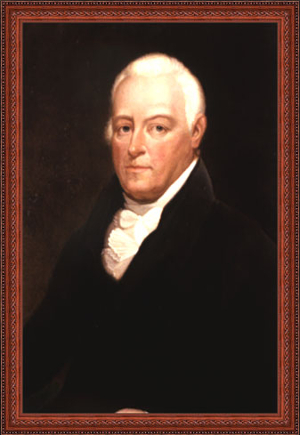1754-1829
Associate Justice of the Supreme Court, 1790-1798
Chief Justice, 1798-1801
Chancellor of New York, 1801-1814
John Ten Eyck Lansing, Jr., born on January 30, 1754 in Albany, New York, was of Dutch ancestry. He graduated from King’s College (Columbia University), studied law in Albany with Robert Yates (later Chief Justice of New York) and with James Duane in New York City, breaking from his studies in 1776 and 1777 to act as military secretary to General Schuyler. Following his admission to the bar in 1779, he practiced law in Albany.
Lansing was a Member of Assembly during the years 1781-1784, and a member of Congress under the Articles of Confederation in 1784 and 1785. He returned to the Assembly as Speaker in 1786 and 1788. In 1787, the New York Legislature appointed him, with Robert Yates and Alexander Hamilton, as delegates to the Constitutional Convention at Philadelphia “for the sole and express purpose of revising the Articles of Confederation.” Believing that the convention was exceeding its instructions by drafting a new constitution instead of amending the Articles of Confederation, Lansing and Yates withdrew from the convention on July 10, 1787. The two men published their reasons in a letter to Governor Clinton. Like Yates, Lansing took detailed notes during the debates and these were published by Princeton University Press in 1939. With George Clinton and Melancton Smith, he led the opposition to New York’s ratification of the federal constitution at the 1788 Poughkeepsie Convention. Historians Howel and Tenney pay tribute to Yates and Lansing, stating: To these men and their copatriots, the nation is indebted for the ten important amended Articles which were subsequently made a part of the Constitution.
Governor Clinton appointed John Lansing, Jr. an Associate Justice of the New York Supreme Court of Judicature on February 28, 1790 and on February 15, 1798, Governor John Jay appointed him Chief Justice of New York. In that capacity, he wrote the dissenting opinion in the 1799 breach of promise to marry case of Johnson v. Caulkins. In 1800, Chief Justice John Lansing, Jr. presided over the trial of Levi Weeks (People v. Weeks) for the murder of nineteen-year-old Elma Sands. Henry Brockholst Livingston, Aaron Burr, and Alexander Hamilton represented Mr. Weeks and future Mayor of New York Cadwallader David Colden was the prosecutor.
Lansing was appointed Chancellor of New York on October 25, 1801 and continued in that office until October 25, 1814 when he reached the constitutionally-mandated age of retirement, sixty years. Although there was no formal system of law reporting then, several of his opinions survive and indicate that he was a learned judge. The most controversial case during his Chancellorship was a clash between the Court of Chancery and the New York Supreme Court. When the case was finally resolved against Chancellor Livingston, John V.N. Yates unsuccessfully sued him for unlawful imprisonment (In the Matter of Yates (1810)). Also, while Chancellor, he refused to grant an injunction to restrain a violation of the Fulton-Livingston steamboat monopoly (Livingston v. Van Ingen (1811) on the ground that the monopoly violated the natural rights of citizens to the free navigation of state waters. His decision was overruled by the Court for the Correction of Errors.
Following his retirement as Chancellor, Lansing returned to the practice of the law and authored a small volume entitled Reports of Select Cases in Chancery and in the Supreme Court of the State of New York in 1824 and 1828.
During December 1829, the former Chancellor visited the City of New York on business. On the evening of December 12, he left the City Hotel where he was staying to send an important letter to Albany in the mailbox on board a steamer. John Lansing, Jr. was never seen again and was believed drowned. Many years later, a memoir of the newspaper publisher Thurlow Weed suggested that Lansing was murdered by political opponents.
Sources
Encyclopedia of Biography of New York, vol. 1.
Dictionary of American Biography.

